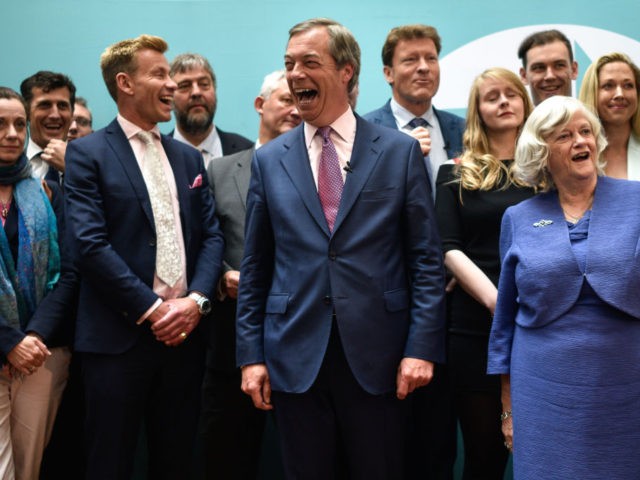Nigel Farage’s Brexit Party is maintaining its position as the number one party favoured by the public should the country face a General Election to choose its next government, even as the traditional governing parties continue to slip down the rankings.
The Brexit Party would come first place with 26 per cent of the vote in a General Election if responses were replicated at the ballot box for the second consecutive week, a new YouGov poll has found.
This is the same result for the Brexit Party as one week ago, the first time the party came first in the national Westminster poll. The result may be seen as particularly impressive for the party as it comes after they were narrowly beaten in a highly publicised local special election, and in a week where the news cycle has been thoroughly dominated by the Conservative Party, which is in the process of selecting a new leader.
Despite the large amount of press coverage that Britain’s governing Conservative Party has enjoyed, it continued to slip down the rankings, falling from 18 to 17 per cent over the course of the week. It was bad news for Jeremy Corbyn’s Labour Party as well, which also slipped one point from 20 to 19 per cent, also losing their joint second place position to the Liberal Democrats who rose two points to 22 per cent.
The continuing support for the Brexit Party — leader Nigel Farage and others have noted — comes predominantly from the betrayal of the democratically-expressed will of the British people to leave the European Union. While the country was slated to leave the European Union on March 29th, 2019, that date has been delayed twice, and voters have punished the Conservative Party — which promised to deliver Brexit at the 2017 snap General Election — by all but wiping out the party in recent elections.
Mr Farage warned that to continue this path would be a “catastrophe” for the party, and if they failed to deliver Brexit once again, then: “I think that would be viewed by many millions of Conservative voters as being a second betrayal… [the Conservatives would be] in very real trouble.”
Other recent polling reinforces this message and strongly implies the Brexit Party’s ongoing success relies on the Conservative Party’s ongoing failure to deliver to the British people. Breitbart London reported this week polling analysis which suggested if the Conservatives failed to select a Brexiteer leader in the present race to replace Theresa May the Brexit Party could win up to 252 seats in a General Election.
Although that would make Nigel Farage’s party the largest in Parliament, they would be short of an outright governing majority.
On the other hand, if the Conservatives chose a leader perceived to be strong on Brexit, Nigel Farage’s insurgent party could see itself routed at the polls, not gaining a single seat if pitched against Boris Johnson, for instance.
While Boris Johnson is presently the lead candidate in the race to be the next leader of the Conservative Party — and hence prime minister of the United Kingdom — this may be a poisoned chalice of sorts. Past experience has shown that the leading candidate in the early stages of Tory leadership challenges tend to struggle, as the fire of all other candidates can be concentrated on them, leaving a lesser known challenger able to slip through and take the crown.
This was seen in action in 2016 when Boris Johnson was favourite again to be leader but was forced out of the competition and Theresa May took the leadership. In 2005, David Davis was thought to be favourite to succeed Michael Howard as party leader but was beaten by the then unknown David Cameron. Even Margaret Thatcher came from a distant third to become leader, defeating incumbent Ted Heath in 1975.
Oliver JJ Lane is the editor of Breitbart London — Follow him on Twitter and Facebook

COMMENTS
Please let us know if you're having issues with commenting.